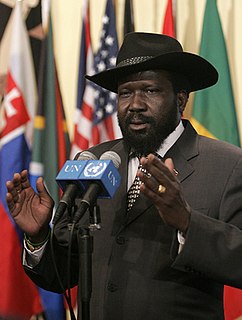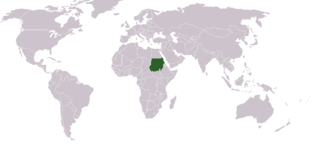Related Research Articles

Sudan, officially the Republic of the Sudan, is a country in Northeast Africa. Bordered by Egypt to the north, Libya to the northwest, Chad to the west, the Central African Republic to the southwest, South Sudan to the south, Ethiopia to the southeast, Eritrea to the east, and the Red Sea to the northeast. Sudan has a population of 43 million and occupies 1,886,068 square kilometres, making it Africa's third-largest country and also the third-largest in the Arab world. It was the largest country in Africa and the Arab world by area before the 2011 South Sudan's secession.
Telecommunications in Sudan includes fixed and mobile telephones, the Internet, radio, and television. Approximately 5 million out of 45 people in Sudan uses internet.

Equatoria is a region of southern South Sudan, along the upper reaches of the White Nile. Originally a province of Egypt, it also contained most of northern parts of present-day Uganda, including Lake Albert. It was an idealistic effort to create a model state in the interior of Africa that never consisted of more than a handful of adventurers and soldiers in isolated outposts.

Salva Kiir Mayardit is a South Sudanese politician who has been President of South Sudan since its independence in 2011. Prior to independence, he was President of the Government of Southern Sudan, as well as First Vice President of Sudan, from 2005 to 2011.

Malakal is a city in South Sudan and second largest city after the national capital Juba.
Juba Arabic, also known since 2011 as South Sudanese Arabic, is a lingua franca spoken mainly in Equatoria Province in South Sudan, and derives its name from the town of Juba, South Sudan. It is also spoken among communities of people from South Sudan living in towns in Sudan. The pidgin developed in the 19th century, among descendants of Sudanese soldiers, many of whom were recruited from southern Sudan. Residents of other large towns in South Sudan, notably Malakal and Wau, do not generally speak Juba Arabic, tending towards the use of Arabic closer to Sudanese Arabic, in addition to local languages. Reportedly, it is the most spoken language in South Sudan despite government attempts to discourage its use due to its association with past Arab colonization.
Sudan has many local and national newspapers. The major national dailies are published in Arabic or English. Sudan Television broadcasts sixty hours of programming a week. The Sudan National Broadcasting Corporation airs radio programming in Arabic, English, French, and Swahili. Radio and television stations are state-controlled entities and serve as outlets for the government viewpoint. Journalists and the papers they serve, although subject to government censorship, operate with more freedom and independence than in most neighboring countries or Arab states. The Voice of Sudan, sponsored by the National Democratic Alliance, broadcasts in Arabic and English. The opposition Sudan People's Liberation Army issues its own newspapers and journals.
Alfred Taban Logune was a South Sudanese broadcast journalist. He was a former BBC's correspondent in Khartoum. He was the founder and former editor in chief of the Juba Monitor, the leading independent newspaper in South Sudan, formerly known as Khartoum Monitor the 1st independent English-Language Newspaper in the Sudan. Taban was also the former Chairman of The Association for Media Development in South Sudan AMDISS. At the time of his death he was serving as the member of parliament in the South Sudan transitional legislative national assembly.
The Juba Post is an independent English-language newspaper in South Sudan. It currently has offices in both Juba and Khartoum. It is the first independent newspaper of South Sudan based in Juba, the capital of the Republic of South Sudan. The newspaper is owned by the Juba Media Company. The Chairman of the Board of Directors is Charles Rehan Surur. In 2011 the newspaper had a circulation of 2500 biweekly issues. It is financially supported by advertising and subscription.

A referendum took place in Southern Sudan from 9 to 15 January 2011, on whether the region should remain a part of Sudan or become independent. The referendum was one of the consequences of the 2005 Naivasha Agreement between the Khartoum central government and the Sudan People's Liberation Army/Movement (SPLA/M).

The following outline is provided as an overview of and topical guide to Sudan:
Radio Dabanga is a shortwave radio station which serves Sudan with daily reports on the latest political, economic and social information, including health issues and social programs such as Lost and Found. The shortwave radio has been broadcasting since December 1, 2008. Current broadcasts last for a total of one hour each day.

The 2011–2013 protests in Sudan began in January 2011 as part of the Arab Spring regional protest movement. Unlike in other Arab countries, popular uprisings in Sudan had succeeded in toppling the government prior to the Arab Spring in 1964 and 1985. Demonstrations in Sudan however were less common throughout the summer of 2011, during which South Sudan seceded from Sudan, but resumed in force later that year and again in June 2012, shortly after the government passed its much criticized austerity plan.

South Sudan, officially known as the Republic of South Sudan is a landlocked country in East-Central Africa. It is bordered to the east by Ethiopia, to the north by Sudan, to the west by the Central African Republic, to the south-west by Democratic Republic of the Congo, to the south by Uganda and to the south east by Kenya.

The economy of South Sudan is one of the world's weakest and most underdeveloped. South Sudan has little existing infrastructure and has the highest maternal mortality and female illiteracy rates in the world as of 2011.

South Sudan is a multilingual country, with over 60 indigenous languages spoken. The official language of the country is English which was introduced in the region during the colonial era.
The Citizen is a newspaper based in Juba, the national capital of South Sudan and the state capital of Central Equatoria.
Radio Bakhita 91.0 FM the Voice of the Church, is media house owned by the Catholic Archdiocese of Juba, South Sudan. It was established in 2006, and officially opened in Juba on February the 8th 2007, the day the Church there celebrates the country's first saint, St Josephine Bakhita. It was established with the aim of "creating a platform to promote evangelization, communication for peace and good governance, as well as the general public’s active participation in the life of the country."
Radio is the main source of news and information in South Sudan.
Telecommunications in South Sudan includes fixed and mobile telephones, the Internet, radio, and television.
References
- 1 2 Carlstrom, Gregg (12 July 2011). "South Sudan journalists facing intimidation". Al Jazeera English. Retrieved 12 July 2011.
- ↑ "South Sudan". Freedom House.
- ↑ "South Sudan's Media Landscape Has Long Path Toward Democratization". South Sudan Info. 11 July 2011. Archived from the original on 29 July 2011. Retrieved 2 August 2011.
- ↑ Odongo, Robert (17 July 2011). "Khartoum bans South Sudan newspapers". Talk of Sudan. Retrieved 2 August 2011.[ permanent dead link ]
- ↑ "2013 World Press Freedom Index" (PDF). Reporters Without Borders. Archived from the original (PDF) on 2015-10-13.
- ↑ "The Price of Silence: Freedom of Expression Under Attack in South Sudan" (PDF). Amnesty International and Human Rights Watch. August 2014. Retrieved 2015-10-16.
- 1 2 "South Sudan: Media and Telecoms Landscape Guide" (PDF). INFOASAID.
- ↑ Waakhe, Simon. "South Sudan's Citizen newspaper lays off staff, forced to close". The Niles. Retrieved 2015-10-16– via 2015-09-16.
- 1 2 "South Sudan Newspapers and News on the Internet". Stanford University. Retrieved 2 August 2011.
- ↑ "Archived copy". Archived from the original on 2015-05-30. Retrieved 2015-05-01.CS1 maint: archived copy as title (link)
- ↑ "Talk of Juba - Latest South Sudanese News, Sport and Entertainment". Talk of Juba.
- ↑ "Nyamilepedia". Nyamilepedia.
- ↑ "South Sudan News Portal - A smart speedy take on Sudan". South Sudan News Portal.
- ↑ "The Upper Nile Times". The Upper Nile Times. Archived from the original on 2015-05-01. Retrieved 2015-05-01.
- 1 2